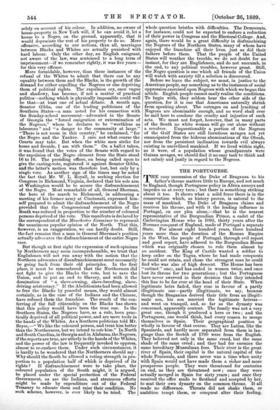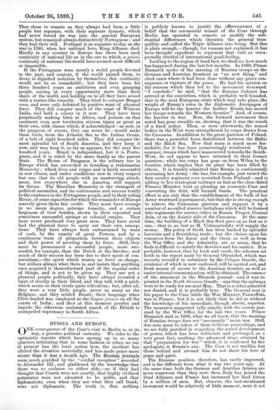THE PORTUGUESE.
E easy succession of the Duke of Braganza to his father's throne matters little to Europe, and not much to England, though Portuguese policy in Africa annoys and impedes us at every turn ; but there is something striking about it too. It shows what a solid force there is in the conservatism which, as history proves, is natural to the mass of mankind. The Duke of Braganza claims and receives his throne, and with it the leading influence in Portugal, on one plea alone,—that he is the nearest representative of the Burgundian Prince, a cadet of the Carlovingian House who in 1095, thirty years after the Norman conquest of England, made of Portugal a separate State. For almost eight hundred years, three hundred years more than the duration of the Roman Empire in the West, the people of Portugal, through evil report and good report, have adhered to the Burgundian House which was originally chosen to rule them almost by an accident. The King of Castile wanted a soldier to keep order on the Tagus, where he had made conquests he could not retain, and chose the strongest man he could find who was also of high descent. The House has been " extinct " once, and has ended in women twice, and once lost its throne for two generations ; but the Portuguese have never swerved in their decision that they intended this line to be for ever at the head of their State. When legitimate heirs failed, they rose in favour of a partly illegitimate one—partly illegitimate, we say, because though the Braganzas derived their title from an illegiti- mate son, his son married the legitimate heiress— and went on tranquil, and, so far as the dynasty was concerned, apparently content. The family was not a very great one, though it produced a hero or two ; and the Portuguese, one would think, had every reason to merge themselves in Spain. Their geographical position is wholly in favour of that course. They are Latins, like the Spaniards, and hardly more separated from them in lan- guage than the Scotch of 1700 were from the English. They believed not only in the same creed, but the same shade of the same creed ; and they had for enemies the same hereditary Mussulman foes. Their river is the great river of Spain, their capital is the natural capital of the whole Peninsula, and there never was a time when unity with Spain would not have made them a richer and more prosperous people. They were threatened for centuries on end, as they are threatened now ; once they were actually merged in Spain for sixty years ; and once they received the offer made to Scotland and accepted by her, to seat their own dynasty on the common throne. It all made no difference. Threats did not shake them, or ambition tempt them, or conquest alter their feeling. They chose to remain as they always had been, a little people but separate, with their separate dynasty, which had never forced its way into the general European system, but remained always distinctively Portuguese ; and they had their will. Portugal is as separate to-day as she was in 1185, when her national hero, King Alfonso, died. Hardly in any country in Europe has there been such continuity of national life as in the one to which, a priori, continuity of national life would have seemed most difficult or impossible.
If the Portuguese were merely a stolid people devoted to the past, and content, if the world passed them, to decay in dignified isolation by themselves, this continuity would not be so remarkable ; but they have been for three hundred years an ambitious and even grasping people, seizing at every opportunity more than their share of the world, and holding on to all they have seized with a terrier-like tenacity. They tried to conquer Bengal once, and were only defeated by positive want of physical force. They did conquer much of the coast of Western India, and hold a colony in it now. They have been perpetually making bites at Africa, and possess on that continent even now territories sixteen times as great as their own, with claims which, if acknowledged—as now, in the progress of events, they can never be—would make them lords, from the Atlantic Sea to the Indian Ocean, of a belt of eight hundred miles. They did conquer the most splendid bit of South America, and they keep it now, and may keep it, so far as appears, for the next five hundred years. Brazil is independent, but it is Portu- guese, and it is ruled by the same family as the parent State. The House of Braganza is the solitary one in Europe which has succeeded in founding a transmarine Monarchy ; which lives and reigns and is fairly successful in new climes, and under conditions new in every respect but one, that its old people with an unswerving attach- ment, lost everywhere else in America, still support its throne. The Brazilian Monarchy is the strangest of political anomalies, and its continuance and success testify to the existence in the Portuguese people, and in their ruling House, of some capacities for which the remainder of Europe scarcely gives them fair credit. They must have courage in no mean degree, extreme tenacity, and a certain largeness of view besides, shown in their repeated and sometimes successful springs at colonial empire. They have never produced very great men. They have never had the physical force to carry out their own concep- tions. They have always been embarrassed by want of cash, by the enmity of great Powers, and by a continuous want of proportion between their objects and their power of securing them by force. Still, they must be pronounced a successful people, more suc- cessful, for example, than the Dutch or the Swedes ; and much of their success has been due to their spirit of con- servatism,—the spirit which wastes no force on change, but utilises always what there is, and insists that anything once acquired is thenceforward part of the regular order of things, and is not to be given up. They are not a pleasant people politically, they have always revealed a taint of cruelty in their blood, and they talk with a pride which seems to their rivals quite ridiculous ; but, after all, they were a very little people, never as many as the Belgians, and they settled Brazil ; their language when Clive landed was employed as the lingua franca on all the coasts of India; and they at this moment perplex and impede the otherwise unresisted march of the British to unimpeded supremacy in South Africa.







































 Previous page
Previous page